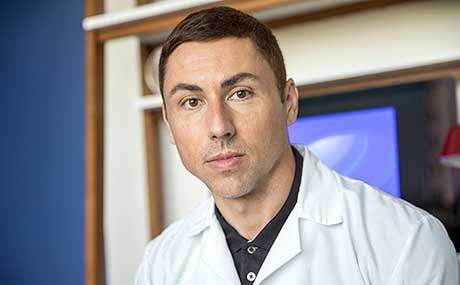 It's difficult to look at the life of Dr. Jerry Chipuk '97 and not give some credence to destiny. The child of immigrant parents who instilled in him a strong work ethic, Chipuk was the first in his family to advance beyond high school after embracing science as a child.
It's difficult to look at the life of Dr. Jerry Chipuk '97 and not give some credence to destiny. The child of immigrant parents who instilled in him a strong work ethic, Chipuk was the first in his family to advance beyond high school after embracing science as a child.
At an early age, he eschewed television, toys and video games in favor of real-life experiences and experimentation.
"I think I was around 10 years old when I conducted my first experiment for a science fair," Chipuk said. "I worked in my grandmother's basement to determine how different surfaces affected the crystallization of salt solutions."
At BW, Chipuk declared a major in biology. Having an interest in art and dance, he included both disciplines in his studies and sought ways to integrate them with his career goals.
"Communicating science for the purposes of education and funding requires a high-level understanding of language and visual aesthetics, and I like to think that I'm both an artist and scientist," Chipuk shared.
After graduating from BW, Chipuk went on to earn his Ph.D. in pharmacology from Case Western Reserve University. Today, he serves as the associate director of The Tisch Cancer Institute at Mount Sinai's Icahn School of Medicine in New York City where he and his team focus on the role of mitochondria in human health and disease.
It's a demanding job, but Chipuk takes it in stride. "My approach is to complete goals one at a time and not distract myself by worrying about lists of items to complete."
Chipuk credits a variety of BW undergraduate experiences with laying a solid foundation for his postgraduate success. He performed independent research in electron microscopy under the tutelage of Dr. Stephen Hilliard and explored the organic synthesis of liquid crystal precursors with the guidance of Dr. Stephen Tytko.
"Drs. Hilliard and Tytko treated me like an independent thinker and enabled me to quickly appreciate the influence faculty can have outside the classroom," Chipuk said.
Chipuk also assisted Dr. Michael Melampy with an analysis of mustard plant seed pods and spent one summer studying cancer-signaling mechanisms at the University of North Carolina, Chapel Hill.
"BW taught me the value of a liberal arts education," he says of his well-rounded experience. "My current interests are based on the experience and education I obtained there."